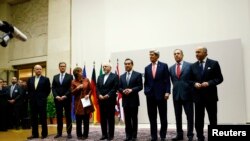GENEVA —
U.S. President Barack Obama has hailed peaceful diplomatic efforts that have led to a nuclear deal with Iran after nearly a decade of tensions.
Mr. Obama spoke late Saturday in Washington after six powers meeting with Iran's representatives reached a set of initial understandings on halting the progress of Iran's nuclear program and rolling it back in key respects.
President Obama said the initial, six-month step includes significant limits on Iran's nuclear program and addresses most urgent concerns, including Iran’s enrichment capabilities; its existing stockpiles of enriched uranium; the number and capabilities of its centrifuges; and its ability to produce weapons-grade plutonium using the Arak reactor.
Iran has also committed to provide increased transparency and intrusive monitoring of its nuclear program, which could have led to a development of nuclear arms.
In return, the United States, China, Russia, Britain France and Germany will provide limited, temporary, targeted and reversible relief to Iran. Major sanctions, including the key oil, banking and financial sanctions will remain in place.
The deal was reached after midnight Saturday in Geneva after five days of tough negotiations.
U.S. Secretary of State John Kerry joined the talks in Geneva earlier Saturday.
Swiss Foreign Minister Didier Burkhalter held talks with Iran's Zarif on Saturday.
World powers believe Iran's nuclear program can be used to develop nuclear arms and have imposed sanctions on the oil-rich country. Tehran argues that it is developing nuclear power for energy and other peaceful purposes.
European Union foreign policy chief Catherine Ashton has been leading the negotiations with the Iranians. The main sticking points have been to what extent Iran will be allowed to enrich uranium and how much sanctions against Tehran would be eased.
Mr. Obama spoke late Saturday in Washington after six powers meeting with Iran's representatives reached a set of initial understandings on halting the progress of Iran's nuclear program and rolling it back in key respects.
President Obama said the initial, six-month step includes significant limits on Iran's nuclear program and addresses most urgent concerns, including Iran’s enrichment capabilities; its existing stockpiles of enriched uranium; the number and capabilities of its centrifuges; and its ability to produce weapons-grade plutonium using the Arak reactor.
Iran has also committed to provide increased transparency and intrusive monitoring of its nuclear program, which could have led to a development of nuclear arms.
In return, the United States, China, Russia, Britain France and Germany will provide limited, temporary, targeted and reversible relief to Iran. Major sanctions, including the key oil, banking and financial sanctions will remain in place.
The deal was reached after midnight Saturday in Geneva after five days of tough negotiations.
U.S. Secretary of State John Kerry joined the talks in Geneva earlier Saturday.
Swiss Foreign Minister Didier Burkhalter held talks with Iran's Zarif on Saturday.
World powers believe Iran's nuclear program can be used to develop nuclear arms and have imposed sanctions on the oil-rich country. Tehran argues that it is developing nuclear power for energy and other peaceful purposes.
European Union foreign policy chief Catherine Ashton has been leading the negotiations with the Iranians. The main sticking points have been to what extent Iran will be allowed to enrich uranium and how much sanctions against Tehran would be eased.





